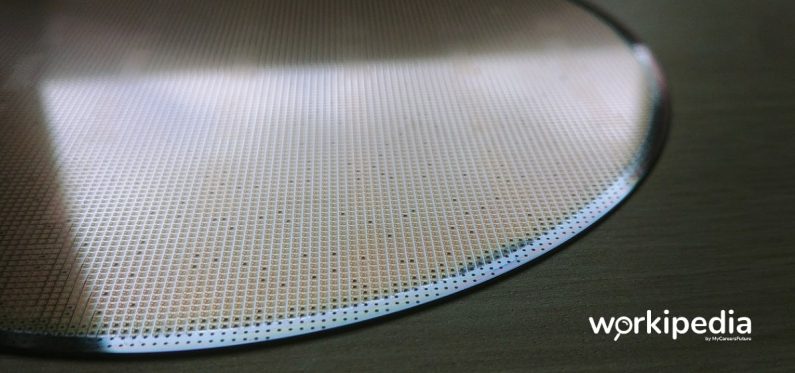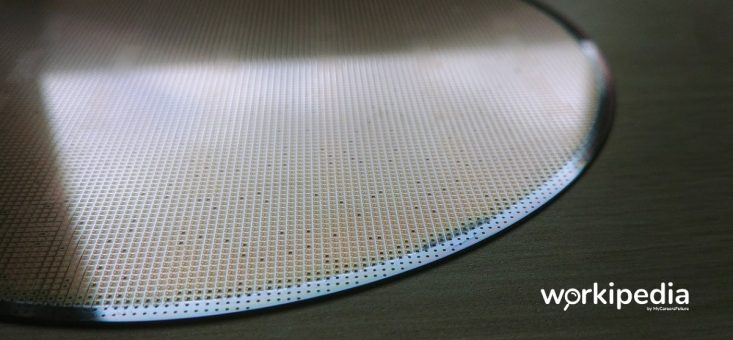Here are some fun facts: Did you know that 70% of wire bonders used in the global semiconductor industry are produced in Singapore? We also account for 10% and 30% of global output for refrigeration compressors and hearing aids, respectively.
And if you didn’t know, 20% of the global semiconductor equipment output comes from Singapore, and nine out of the top 10 wafer fabrication equipment companies procure significantly from Singapore-based suppliers.
So what is precision engineering, and what’s the industry like in Singapore?
Precision engineering (PE) is the process of designing and manufacturing machines and components that meet precise specifications. This field requires a high degree of accuracy and attention to detail, as even minor errors can have significant consequences.
The kind of nano-scale defects made-in-Singapore wafer inspection tools can identify is comparable to spotting a strand of hair from a height of 600m.
There are over 100,000 jobs available on MyCareersFuture. Apply for your next job role here!
Such feats reflect Singapore’s sophisticated precision engineering capabilities and our strengths as a leading regional hub for advanced manufacturing.
In Singapore, over 2,700 PE firms supply critical products and expertise needed to manufacture complex components and equipment used in industries such as semiconductors, medical technology, marine, offshore and aerospace.
Singapore PE companies have a full suite of design, prototyping, production and supply chain management capabilities, which allow manufacturers to easily find a “total solution” here rather than source from multiple suppliers.
These companies saw a boost in business during the pandemic, as well as after it, due to more businesses embracing digitalisation.
What jobs are available in the precision engineering market now?
For some context, there were 85,878 people employed in the precision engineering industry here as of 2021, according to statistics from the Economic Development Board (EDB).
The most in-demand jobs in the industry are process engineers, tooling engineers and skilled technicians, said Mr Steven Koh, executive director of Singapore Precision Engineering and Technology Association to the Straits Times.
It also supports other industries, such as the semiconductor, aerospace and medical technology industries. It is also critical to the electronics, aerospace, automotive, marine offshore, and medical technology industries.
Some of the key technologies supported by the PE industry include:
- Forming
- Surface engineering
- Mechatronics
- Precision Measurements
- Joining and Machining
“Singapore, with its existing infrastructure and business-friendly policies, is well suited to expand the PE facilities and become an integral part of emerging supply chain ecosystems. This not only will generate additional jobs but also diversify the workforce,” said Associate Professor (AP) Senthil Kumar from the Mechanical Engineering faculty at the National University of Singapore.
Reskilling and upskilling are crucial for the precision engineering industry
However, AP Senthil shared that there is still a shortage of experienced workers with domain knowledge and software skillsets for cyber-physical systems.
To assist workers in the PE industry with better training and jobs, a pilot programme was launched by Nanyang Polytechnic’s (NYP) School of Engineering in March 2023.
This is part of the new Jobs-Skills Integrator (JSIT) initiative, first announced in mid-February by Deputy Prime Minister Lawrence Wong in his Budget statement.
These intermediaries, which DPM Wong called “Job-Skills Integrators”, will work with industry, training and employment facilitation partners to:
- Engage industries to understand their manpower and skill gaps
- Work with training providers to update existing training programmes or develop new ones to close skill gaps
- Work closely with employment agencies, get buy-in from industry partners and unions, and help them identify Singaporean workers with the right aptitude
The PE industry was selected to kickstart this initiative with the retail and wholesale trade sectors because it has a higher concentration of mature workers, small-medium enterprise (SME) employers and job vacancies that tend to remain unfilled.
Minister of State for Education and Manpower Gan Siow Huang elaborated in Parliament in March 2023: “Through this pilot, we hope to better meet the industry’s need for a skilled workforce while enabling more workers to take up upskilling to meet their career aspirations and to stay employable.”
Dr Phua Chee Teck, director of NYP’s School of Engineering, told The Straits Times that NYP will work with Singaporean-based companies to develop an end-to-end process for training job seekers and upskilling existing employees.
“As the JSIT for the PE sector, we look forward to working closely with our partner agencies to coordinate and align the industry development plans and training needs for the sector,” he said.















